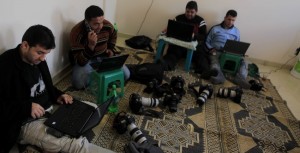
Palestinian journalists, working both in state media outlets and foreign news agencies, are challenging difficulties to deal with various events due to the different editorial policies adopted by the news agencies they are working for.
A number of Palestinian journalists expressed displeasure about the editorial policies, adopted by local outlets, that serve the partisan interests in some cases and the Palestinian dimension in other cases, instead of adopting a comprehensive professional processing of Palestinian issues.
Sami Abu Salem, Gaza-based Palestinian journalist, working for the Palestinian official news agency WAFA and for the Dutch international public broadcaster,Radio Netherlands Worldwide, knows no fear of using different styles when writing and editing the same news articles and reports for both WAFA and Radio Netherlands Worldwide.
Abu Salem explained that the style that the Palestinian journalist uses in writing news article and reports is dominated by two perspectives mainly, first the Israeli occupation’s violations in the Gaza Strip, and the second the political split between Fatah and Hamas.
He said that “For WAFA, for instance, it is useless to mention the Israeli opinion and the official reaction, when writing about the Israeli violations in the Gaza Strip; meanwhile, when it comes to the internal political situation, almost Fatah’s stereotype and opinions take the priority, while Hamas ones do not enjoy the adequate space in Wafa’s news articles and reports.”
He continued, ”I do not have that enthusiasm to write for WAFA because of lack of competition, whereas I do enjoy a full freedom and motivation to write for the radio, because radio’s editorial policies make it imperative to write professionally and neutrally, as well as regarding the Israeli reaction which is must to be mentioned in the radio reports.”
Abu Salem added, ”the news agencies use different terminology when writing news reports.For instance, WAFA use a different news terms of that are used by international and foreign news agencies that I do work for.”
He continued, ”For WAFA, which is a Palestinian official news agency, the news terminology must be primarily Palestinian; when it comes to Hamas, terms are used as determined by the agency’s editorial policy, which may vary from time to time.”
Palestinian local media faces different difficulties: mainly the sharp political polarization between the various Palestinian parties not to mention the editorial policies adopted by the outlets owned by these political parties to serve only the interests of these parties.
Nasser Abu Bakr, Ramallah based journalist, who works for Agence France Presse (AFP) and the Palestine TV, which is controlled by the Palestinian Authority (PA), stated that “the editorial policy for Palestine TV imposes on him the language he uses in TV reports; whereas for AFP professionalism is an important criterion.”
“If there was a political escalation between Fatah and Hamas, the Palestine TV demands me to use more sharp terminology when it comes to Hamas; whilst when the political atmosphere of reconciliation dominates between the two parties of division, the editorial policy imposes me to use soft ones towards Hamas,” said Abu Bakr.
Fathi Sabbah, board chairman of Palestinian Institution for Communication &Development (PICD), accused the local media for being unprofessional.
“Local media is not committed to the ethics of journalism and professional standards, and it is biased for any of political affiliations and satisfies a political party.” said Sabbah.
Adel Zaanoun, the Reporter for Voice of Palestine Radio and Agence France Presse (AFP) in Gaza Strip, stated that he faces difficulties due to the standards imposed by the radio station he works for.
He hopes that standards imposed on him by the radio would not harm his personal reputation as a reporter for AFP.
“My previous work with Palestine TV and current work with the Voice of Palestine, imposed me not to mention the other’s opinions, whereas professionalism standards at AFP require me to mention the other’s opinions whatever these opinions are, a situation which many times forced me to resign from the Palestine TV, that always kept rejecting my resignation,” said Zaanoun.
He explained that sometimes the prepared for AFP news reports have political dimension, and require a wide media coverage and a mention to the public reactions; whereas the same reports do not get the same space and media coverage on the Voice of Palestine Radio, this due to the editing policy imposed by the radio.
Despite the political and financial problems that afflict local media outlets in Palestine depending neither from Israeli occupation or political division between Fatah and Hamas, this situation might turn the local media into a tool rather than to reveal the facts and evidences.



